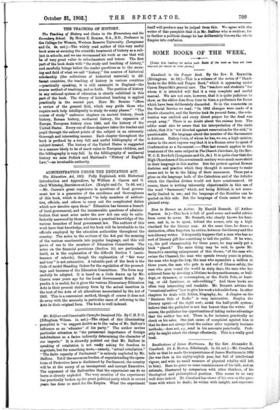How to Become an Author. By Harold Bennett. (C. Arthur
Pearson. 5s.)—This book is full of good sense and useful advice from cover to cover. Mr. Bennett, who clearly knows his busi- ness, and is, so to speak, behind the scenes, sets up a high standard for the literary man. At the same time, he draws a. distinction, often forgotten by critics, between the literary and the non-literary writer. It frequently happens that a man who has no sort of literary gift has something to tell the public. If he wins, e.g., the golf championship for three years, he may easily get a. book " placed." The same thing may be said, to quote Mr. Bennett's amusing enlargement of this theme, "of the man who. swims the Channel, the man who spends twenty years in prison, the man who loops the loop, the man who squanders a million in three years, the man who gets in and out of Lhassa safely, the man who goes round the world in sixty days, the man who has achieved fame by devoting a lifetime to chrysanthemums, or bull- dogs, or dynamos, or consumption, or the North Pole, or hunt- ing, or old furniture, or safe-robbing." And these books are often very interesting and readable. Mr. Bennett advises the "occasional author" how to give his work a tolerable form. In other chapters he deals with fiction, biography, &c. A chapter on the "Business Side of Books" is very instructive. Employ the literary agent—of the right sort; avoid the half-profit system ; believe that the publisher is not less honest than the writer. Of course, the publisher has opportunities of taking undue advantage that the author has not. There is, for instance, practically no check on his sales. One just cause of complaint against him is that he does not always treat the author after regularly business methods,—does not, e.g., send in his accounts punctually. Prob- ably he might retort the charge effectively. This is a really good book.


















































 Previous page
Previous page